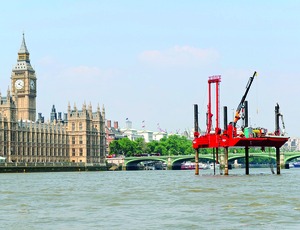
In one of the largest acquisitions so far this year for a U.S. firm, Colorado-based CH2M Hill Cos., said Sept. 26 that it has agreed to acquire London-based global transportation engineer Halcrow Group Ltd. for about $192 million in cash. The deal, which the Englewood, Colo.-based firm says also includes the U.K. firm's outstanding debt and pension liability, could be valued at more than $356 million.
The transaction, set to close in November, would expand CH2M Hill's global footprint and engineering strength, and improve cash flow lines for privately-held Halcrow as it struggles in some markets. The deal must be approved by Halcrow shareholders and the U.K.'s high court, says the propective parent.
CH2M Hill is the industry’s fifth largest global design firm, with $3.6 billion in 2010 worldwide revenue, about $891 million outside the U.S. and about 17% in transportation work. The firm, which also has expertise in design-build, operations and program management, reports $6.3 billion in total revenue. Halcrow reported 2010 revenue of about $719 million. It is ranked 52nd on ENR's list of the Top 150 Global Design Firms, with about 61% of 2010 revenue in transportation, 14% in general building and 11% in water supply.
"This acquisition is a game-changer," says CH2M Hill CEO Lee McIntire. "Our global footprint will be deeper and our bench strength even more robust." While Halcrow's 6,000-person workforce is down from the 6,983 employees reported to ENR in July, the total includes 3,000 engineers, "a high percentage in the industry," he says.The firm had announced in 2009 that it was cutting 269 positions due to cutbacks in U.K. infrastructure spending and reported to ENR in July that it had reduced international staffing 11% in 2010 and domestic employment by 6%.
McIntire says the completed deal would create a global company of 30,000 employees, with 11,000 outside the U.S. Halcrow "has a pretty good backlog" he says, adding that the combined firm would have $7.1 billion in revenue. Halcrow CEO Peter Gammie, who is set to retire when the deal closes and become a consultant, says where the firms "share geographies, we are reinforcing one another rather than duplicating."
McIntire says the rest of Halcrow's senior management will remain in place, but that it will take two quarters before restructurings occur, including decisions on the status of the U.K. firm's brand.
McIntire says Halcrow has been on CH2M Hill's radar "for decades," but that the U.K. firm's board approached the U.S. company in the current proposed transaction. The firms have both been working since 2008 on the Thames Tideway project, a $6-billion sewage interceptor and storage tunnel through London. The U.S. firm is the project's program manager; Halcrow is a project subcontractor.
CH2M Hill had made purchase overtures to Halcrow in June 2010, which were not accepted, leading the U.S. firm to made a failed bid for another U.K. transportation engineer, England-based Scott Wilson. URS Corp. won the intense bidding war for the firm, with a $333-million final offer. While analysts were relatively positive about the higher price, some sources believe URS overpaid.
Former Halcrow executives and industry observers, who declined to speak publicly, point to impacts on the U.K. firm's bottom line from falloffs in British and U.S. infrastructure markets. "Half their business is in the U.K. which is flat on its back," says one. Another points to more "cost reductions globally." Like other firms, Halcrow also faces payment difficulties in the Middle East whch makes up 25% of revenue. It also has to reduce overhead in North America "from the stratosphere, which is where it was," says another observer.
CH2M Hill points to Halcrow's century of international work experience in boosting the prospective parent, which has been abroad for 20 years, says McIntire. Halcrow's roots date back to a predecessor firm founded in 1868, but it has been a global infrastructure design leader since the early 1940s under the late Sir William Halcrow. The firm has 80 offices in 70 countries, it says.



Post a comment to this article
Report Abusive Comment